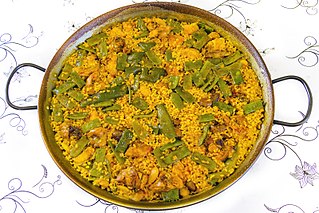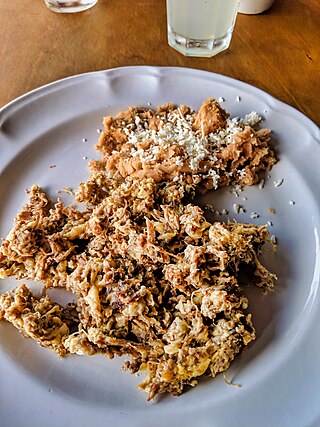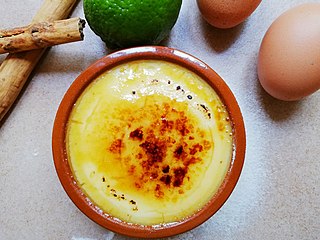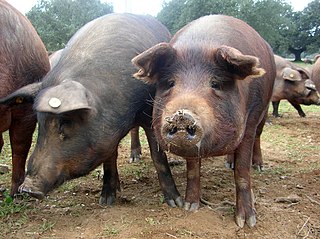

Aletria is a custardy Portuguese dessert based on vermicelli (aletria). In the Beiras region, aletria has a compact consistency, and is able to be cut in slices, whereas in Minho its consistency is more creamy. [1]


Aletria is a custardy Portuguese dessert based on vermicelli (aletria). In the Beiras region, aletria has a compact consistency, and is able to be cut in slices, whereas in Minho its consistency is more creamy. [1]
Llibre de Sent Soví, a set of two 14th-century manuscripts, in Catalan, contains a compilation of 200 recipes, of which there are two with alatria (170: Qui parla con se cou alatria or "how to cook vermicelli" and 171 : Qui parla con se cou carn ab alatria or "how to cook meat with vermicelli"). [2] [3] However, what they called vermicelli should have a very different shape from the current thin strands of dough. [4]
Vermicelli was probably brought to the Iberian Peninsula by the Moors in the 8th or 9th century. [5] It remained in Portugal and incorporated into Portuguese cuisine, and began to designate the mass of very fine yarns, with which a typical Christmas candy, present in almost all regions of the country, is prepared. The name aletria itself has disappeared in Spain, remaining only in the region of the ancient Kingdom of Murcia. [6] It is however noteworthy that Catalan cuisine has enriched itself a lot with products promoted by the Arabs, including vermicelli. [7]

Spanish cuisine consists of the traditions and practices of Spanish cooking. It features considerable regional diversity, with important differences between the traditions of each of Spain's regional cuisines.

Paella is a rice dish originally from the Valencian Community. Paella is regarded as one of the community's identifying symbols. It is one of the best-known dishes in Spanish cuisine.

Catalan cuisine is the cuisine from Catalonia. It may also refer to the shared cuisine of Northern Catalonia and Andorra, the second of which has a similar cuisine to that of the neighbouring Alt Urgell and Cerdanya comarques and which is often referred to as "Catalan mountain cuisine". It is considered a part of western Mediterranean cuisine.

Vermicelli is a traditional type of pasta round in section similar to spaghetti. In English-speaking regions, it is usually thinner than spaghetti, while in Italy, it is thicker.

MachacaSpanish:[maˈtʃaka] is a traditionally dried meat, usually spiced beef or pork, that is rehydrated and then used in popular local cuisine in Northern Mexico and the Southwestern United States. It is also readily available in many groceries and supermarkets in these areas. In areas where the dried meat product is not easy to obtain, slow-cooked roast beef (brisket) or skirt steak shredded and then fried is sometimes substituted.

Sofrito, sofregit, soffritto, or refogado is a basic preparation in Mediterranean, Latin American, Spanish, Italian and Portuguese cooking. It typically consists of aromatic ingredients cut into small pieces and sautéed or braised in cooking oil for a long period of time over a low heat.

Crema catalana 'Catalan cream' or crema cremada 'burnt cream' is a Catalan and Spanish dessert consisting of a custard topped with a layer of caramelized sugar. It is "virtually identical" to the French crème brûlée. Like all custards, it is made from milk, egg yolks, and sugar. Some modern recipes add cornflour. It is typically flavored with lemon zest, cinnamon, or vanilla, and a crisp caramel crust is made by caramelizing sugar placed on top of the custard.

Arroz a la valenciana or Valencian rice is a name for a multitude of rice dishes from diverse cuisines of the world, which originate from the rice-cooking tradition of the Valencian Community, in eastern Spain.
Martino de Rossi, was an Italian 15th-century culinary expert who was unequalled in his field at the time and could be considered the Western world's first celebrity chef. He made his career in Italy and was the chef at the Roman palazzo of the papal chamberlain ("camerlengo"), the Patriarch of Aquileia. Martino was applauded by his peers, earning him the epitaph of the prince of cooks. His book Libro de Arte Coquinaria is considered a landmark in Italian gastronomic literature and a historical record of the transition from medieval to Renaissance cuisine.

Extremadura, Spain is known for its different ways of preparing the Iberian pork and mutton. The main characteristics of the traditional Extremaduran cuisine are its simplicity, its lack of clutter and its low cost. It is also a cuisine reflecting a generous spirit, for many of its preparations used to be cooked in large pots to share with visitors, friends, and neighbors. The resulting dishes are eaten with local bread.

The 2010 Catalan regional election was held on Sunday, 28 November 2010, to elect the 9th Parliament of the autonomous community of Catalonia. All 135 seats in the Parliament were up for election. This was the first election held in Catalonia after the Constitutional Court of Spain struck down parts of the regional 2006 Statute of Autonomy that granted new powers of self-rule to the region. The ruling came after four years of deliberation concerning a constitutional appeal filed by the conservative People's Party (PP) under Mariano Rajoy and was met with anger and street protests throughout the region.
José Miguel Morales Martínez is a Spanish former professional footballer who played as a goalkeeper.
Robert de Nola, also known by pseudonym Mestre Robert, was a Spanish chef who authored the first printed cookbook in Catalan language, Llibre del Coch. He served as cook to King of Naples Ferdinand I.

Democrats of Catalonia is a Christian-democratic, pro-Catalan independence political party in Catalonia founded in July 2015 from a split in Democratic Union of Catalonia (UDC). Its members included the then-Speaker of the Catalan parliament Núria de Gispert and former UDC president Joan Rigol. The party has received accusations of xenophobia for its controversial statements against Spaniards and for having ties with xenophobic organizations.
Left Movement of Catalonia is a social-democratic, pro-independence political party in Catalonia. The party was founded in November 2014 from the merger of New Catalan Left (NECat) and Catalonia Movement, which had both been formed by dissident members of the Socialists' Party of Catalonia (PSC) who were dissatisfied with what they saw as the party's lack of support for the independence movement. Its founders included Marina Geli and Ernest Maragall (NECat), but both have ever since left for other parties—Geli joined the Together for Catalonia alliance ahead of the 2017 Catalan regional election, whereas Maragall defected to Republican Left of Catalonia (ERC) in 2018.

The 2017 Catalan regional election was held on Thursday 21 December 2017 to elect the 12th Parliament of the autonomous community of Catalonia. All 135 seats in the Parliament were up for election. The election was called by Spanish prime minister Mariano Rajoy after the invocation of Article 155 of the 1978 Spanish Constitution to enforce direct rule in Catalonia and the subsequent dismissal of the Catalan government under President Carles Puigdemont. The three pro-Catalan independence parties won a slim majority of parliamentary seats, claiming 70 out of 135, but fell short of a majority in the popular vote by securing 47.6% of the share.

The 2021 Catalan regional election was held on Sunday, 14 February 2021, to elect the 13th/14th Parliament of the autonomous community of Catalonia. All 135 seats in the Parliament were up for election.

The Libre del Coch, or Libre de doctrina per a ben servir, de tallar y del art de coch cs de qualsevol manera, potatges y salses compost per lo diligent mestre Robert coch del Serenissimo senyor Don Ferrando Rey de Napols, is a Catalan recipe book written around 1490 by Master Robert de Nola. Its earliest preserved printed edition is from 1520, published in Catalan in Barcelona. It includes mainly recipes from the Catalan cuisine of the time, some of them inherited from the Libre de Sent Soví, and some from neighboring countries, such as the Occitan cuisine and the Italian cuisine, including traditions from different areas dominated by the Crown of Aragon, which at that time was spread to the northeastern Mediterranean, Southern Italy, Corsica and Sicily. Despite not including Castilian recipes, was also very successful in Castile, was translated into Spanish in 1525 and republished in this language several times. It is considered of great value for acquiring a good knowledge about the gastronomy of the Renaissance.

The 2023 Barcelona City Council election, also the 2023 Barcelona municipal election, was held on Sunday, 28 May 2023, to elect the 12th City Council of the municipality of Barcelona. All 41 seats in the City Council were up for election. The election was held simultaneously with regional elections in twelve autonomous communities and local elections all throughout Spain.